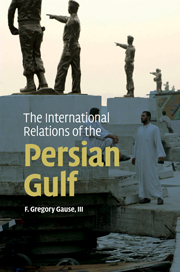Book contents
- Frontmatter
- Contents
- List of maps and tables
- Acknowledgments
- Note on the text and bibliography
- 1 The Persian Gulf as a security region
- 2 The emergence of the Gulf regional system, 1971–1978
- 3 The Iranian Revolution and the Iran–Iraq War
- 4 The Gulf War and the 1990s
- 5 9/11, the Iraq War and the future of the Persian Gulf
- 6 The Iraq War: American decision-making
- 7 Conclusions: war and alliance in the Persian Gulf
- Index
- References
2 - The emergence of the Gulf regional system, 1971–1978
Published online by Cambridge University Press: 05 June 2014
- Frontmatter
- Contents
- List of maps and tables
- Acknowledgments
- Note on the text and bibliography
- 1 The Persian Gulf as a security region
- 2 The emergence of the Gulf regional system, 1971–1978
- 3 The Iranian Revolution and the Iran–Iraq War
- 4 The Gulf War and the 1990s
- 5 9/11, the Iraq War and the future of the Persian Gulf
- 6 The Iraq War: American decision-making
- 7 Conclusions: war and alliance in the Persian Gulf
- Index
- References
Summary
The formal end of British protectorate status for the smaller states of the lower Persian Gulf in 1971 marked the beginning of a new stage in the international politics of the region. British power had been on the decline for decades in the area. London had effectively ceded primacy to the United States in Saudi Arabia during World War II, and in Iran in the aftermath of the 1953 coup against the government of Muhammad Mossadegh. The 1958 military coup that brought down the Hashemite monarchy in Iraq ended British influence in Baghdad. However, the British military and political commitment to the smaller Arab states of the region served as a brake on the ambitions of the larger regional states. That commitment was manifested tangibly in 1961, when Iraq threatened newly independent Kuwait. British forces returned to the shaykhdom to deter any Iraqi military adventure and to assert London's continuing interest in the region. The small British military presence in the region, combined with its commitments to the other Gulf emirates and Oman, in effect prevented Iran, Iraq and Saudi Arabia from competing openly for influence in the area. The United States, its hands more than full with the war in Vietnam, welcomed the British role in the Gulf.
The announcement in 1968 that London would end its military presence in the region and its protectorate relationships with the Emirates and Oman opened up the Persian Gulf as an arena of regional contestation.
- Type
- Chapter
- Information
- The International Relations of the Persian Gulf , pp. 16 - 44Publisher: Cambridge University PressPrint publication year: 2009



